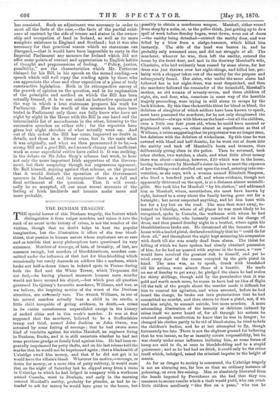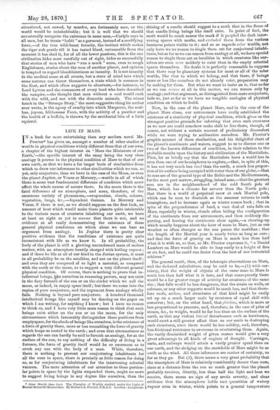THE DENHAM TRAGEDY.
THE special horror of this Denham tragedy, the feature which distinguishes it from vulgar murders, and raises it into the rank of an event in the history of crime, is not the number of the victims, though that no doubt helps to heat the popular imagination, but the illustration it offers of the true blood- thirst, that passion in human nature whose explosions are so rare and so terrible that many philosophers have questioned its very existence. Murders of revenge, of hate, of brutality, of lust, are common enough, but murders of bloodthirstiness, murders com- mitted under the influence of that lust for bloodshedding which occasionally but rarely descends on soldiers like a madness, which broke out half-a-dozen times in isolated spots in France during both the Red and the White Terror, which Tropmann did not feel,—he having planned massacre because mere murder would not have secured his object,—but which past all question governed De Quincy's favourite murderer, Williams, and was, as we believe, the inspiring motive of the worst of the Denham atrocities, are extremely rare. The wretch Williams, in one of his several murders actually beat a child in its cradle, a little child incapable of giving evidence, to death,—a crime in its entire causelessness unparalleled except in the history of sacked cities and in this week's murder. It was at first supposed that the murderer, believed to be a Staffordshire tramp and thief, named John Jenkins or John Owen, was actuated by some feeling of revenge ; that he had sworn some kind of vendetta against his victim Marshall, an engineer living in Denham, Bucks, and it is still uncertain whether he had not some previous grudge or family feud against him. He had been re- peatedly imprisoned for petty thefts, and on his last release told the warder that he would not be imprisoned again ; that a blacksmith of Uxbridge owed him money, and that if he did not get it he would have the villain's blood. Whatever his motive,—revenge, or desire for money, or a mere idea of petty robbery, it would seem that on the night of Saturday last he slipped away from a room in Uxbridge in which he had lodged in company with a workman named Coombs, went to Denham, and early in the morning entered Marshall's smithy, probably for plunder, as had he in- tended to ask for money he would have gone to the house, but possibly to obtain a murderous weapon. Marshall, either roused from sleep by a noise, or, as the police think, just getting up to do a spell of work before Sunday began, went down, went out of doors —the smithy being detached—entered the smithy door, and was felled by a blow from a sledge-hammer, which killed him instantly. The side of the head was beaten in, and he probably only screamed once, and did not struggle at all. The murderer, whoever he was, then left the smithy, entered the house by the front door, and met in the doorway Marshall's wife, Charlotte, who had evidently been roused by some alarm, for her dress was just thrown over her night-things, and killed her, pro- bably with a chopper taken out of the smithy for the purpose and subsequently found. Her sister, who under the same alarm had followed her in her night-dress, was next despatched, and then the murderer followed the remainder of the household, Marshall's mother, an old woman of seventy-seven, and three children of eight, six, and four, who, conscious in some way of the horrible tragedy proceeding, were trying in wild alarm to escape by the back kitchen. By this time the horrible thirst for blood as blood, the delirium of slaughter of which soldiers have been known to speak, must have possessed the murderer, for he not only slaughtered the grandmother—always with blows on the head—but all the children, even a little one four years old, whom he could have secured or frightened with ease,—a crime almost as superfluous as that of Williams, a crime suggesting that its perpetrator was no longer sane, but delirious with the delirium of wickedness. By this time he was covered with blood and half-frantic, for he went out of doors into the smithy and took off Marshall's boots and trousers, thus deliberately giving clues to the police. Then he returned, took other clothes, two watches, a chain, and what little silver money there was about—missing, however, £20 which was in the house, having been drawn by Marshall's sister-in-law to meet the expenses of her wedding—and strolled out upon the road, entering into con- versation, as she says, with a woman named Elizabeth Simpson, who lived a hundred yards off, and whose evidence, though not apparently -distrusted on the spot, is at a distance almost unintelli- gible. She took him for Marshall "by his clothes," and addressed him as Marshall, whom, nevertheless, she must have known by sight, listened to a story about the family having gone out for a fortnight; but never suspected anything, and let him hunt with her for a key lost on the road. The man then went away, re- turned to Uxbridge, where of all places he was most likely to be recognized, spoke to Coombs, the workman with whom he had lodged on Saturday, who instantly remarked on his change of dress, and then passed Sunday night in a brothel, where again his bloodthirstiness broke out. He threatened all the inmates of the house with a loaded pistol, declared exultingly that he "could do for them all," and throughout the night kept menacing his companion with death till she was nearly dead from alarm. The thirst for killing of which we have spoken had clearly obtained possession of him, for he had no quarrel with anyone in the house, a " row " would have involved the greatest risk to himself, and yet he tried every door of the rooms occupied by the girls pistol in hand. The man was, so to speak, drunk with bloodshed till his actions were almost those of a lunatic. He made no use of Sunday to get away, he pledged the chain he had stolen for thirty shillings, though told by the pawnbroker that it was gold and worth much more, he seems to have had no idea of flight till the talk of the people about the murder made it difficult for him to conceal his agitation, and when arrested, before he had heard the charge, he broke out into protestations that he had committed no murder, and then strove to draw a pistol, not, if vie read him aright, to commit suicide, but more murders. A more astounding illustration of the insanity or delirium induced by crime itself we never heard of, for all through his actions he retained enough recollection to know that he was in danger ; he changed his clothes partly to be rid of blood-stains, he tried to hide the children's bodies, and he at last attempted to fly, though fortunately too late. There is not the slightest ground for believing that he was insane, so far as insanity covers responsibility, but he was clearly under some influence inclining him, as some forms of hemp are said to do, at once to bloodshedding and to a stupid quiescence; and as he had had no drink, it could only be the crime itself which, indulged, raised the criminal impulse to the height of mania.
As far as danger to society is concerned, the Uxbridge tragedy is not an alarming one, far less so than an ordinary instance of poisoning, or even fire-raising. Men so absolutely liberated from the bonds imposed by Providence on the bad that they can massacre to secure results which a theft would yield, who can crush little children needlessly "like flies on a pane," who can be stimulated, not cowed, by murder, are fortunately rare, or the world would be uninhabitable ; but it is well that we should occasionally recognize the existence in some men,—Carlyle says in all men, but he treats "habit" as a garment, instead of a modifying force,—of the true wild-beast ferocity, the instinct which makes the tiger cub gentle till it has tasted blood, untameable from the moment it has shed it, for of all the lower passions, this is the one civilization hides most carefully out of sight, hides so successfully that stories of men who have "run a muck" seem, even to rough Englishmen, stories about the men of another planet, and opinion is tempted to regard bloodthirstiness as insanity. It is not insanity in the medical sense at all events, but a state of mind into which some natures can throw themselves, a state which is common in the East, and which often suggests to observers,—for instance, to Lord Lytton and the romancers of every land who have described the vampire,—the thought that man without a soul would rank with the wild, and not with the domestic animals. The wisest touch in the "Strange Story," the most suggestive thing its author ever wrote, is the agony of cruelty into which Margrave, the soul- less, joyous, blithesome Faun, with the activity of a panther and the health of a buffalo, is thrown by the accidental bite of a little squirrel.































 Previous page
Previous page